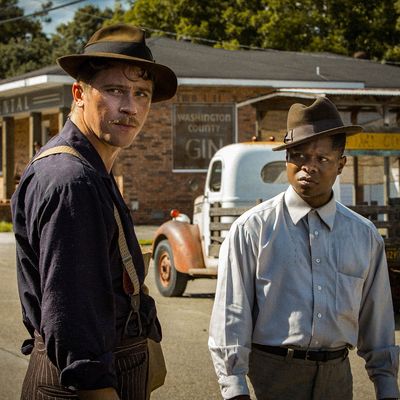
During Mudbound, Dee Rees’s stunning epic that premiered at Sundance last week, I found myself thinking about her remarkable 2011 debut, Pariah. The two projects have almost nothing in common — Mudbound is a grand historical story set in the post–World War II South, while Pariah is a delicate, coming-of-age tale set in Brooklyn — but throughout the newer film, I couldn’t stop thinking about a poem at the end of Pariah:
I am broken
I am open
I am broken open
See the love light shining through me
Shining through my cracks
Rees’s magic touch as a filmmaker, as articulated in this poem and both of her films, is powered by her ability to break her characters open one by one and reveal their souls.
In a script adapted from Hillary Jordan’s novel of the same name, Rees and co-writer Virgil Williams make this ambition evident early on. The unhurried Mudbound settles into a structure of shifting perspectives, via seamlessly interwoven internal dialogues. The film follows the lives of two families, one black and one white, in the postwar Mississippi Delta. Laura (Carey Mulligan), a 31-year-old virgin, meets and marries Henry McAllan (Jason Clarke) in the opening of the film. She doesn’t necessarily love him, but he’s the type of man she can see herself with. On Henry’s wishes, the pair hastily relocate to a remote farm, which seems to be on the brink of deterioration. There, they meet Hap and Florence Jackson (Rob Morgan and an exceptional Mary J. Blige), who have worked on the land for years. The families are soon joined by relatives returning from the war: the Jacksons’ eldest son, Ronsel (Jason Mitchell of Straight Outta Compton), and Henry’s younger brother, Jamie (Garrett Hedlund). Having gone through the hell of war on similar terms, Jamie and Ronsel share a close-knit friendship in front of the judgmental eyes of Henry as well as the elderly McAllan, Pappy (Jonathan Banks), a racist with ties to the Ku Klux Klan who has also moved to the farm.
Ronsel was treated with more respect and dignity abroad than he ever was at home, and the juxtaposition of his wartime experience against the segregation of the South is a powerful portrait of American racism in miniature. Florence and Hap also struggle to maintain their agency from the McAllans. In one terrific scene, they discuss whether Florence should help out Laura with domestic work. “We don’t work for them,” Hap says, to no avail.
Along with cinematographer Rachel Morrison, Rees’s lens superbly distinguishes the Jacksons’ life from McAllan’s — darker tones in the Jackson household contrast to the soothing colors of the McAllans’. Throughout the film’s two-plus hour run time, she captures the elemental grit of the landscape with the expansive majesty of a Western, unearthing the gloom and dismay buried in the mud. But the biggest accomplishment of Mudbound is its restraint; it’s a lyrical lament that aims both for the heart and the mind. Rees, the indie darling of six years ago, is undoubtedly on her way to becoming a prominent filmmaker, with a new kind of American classic already under her belt.

